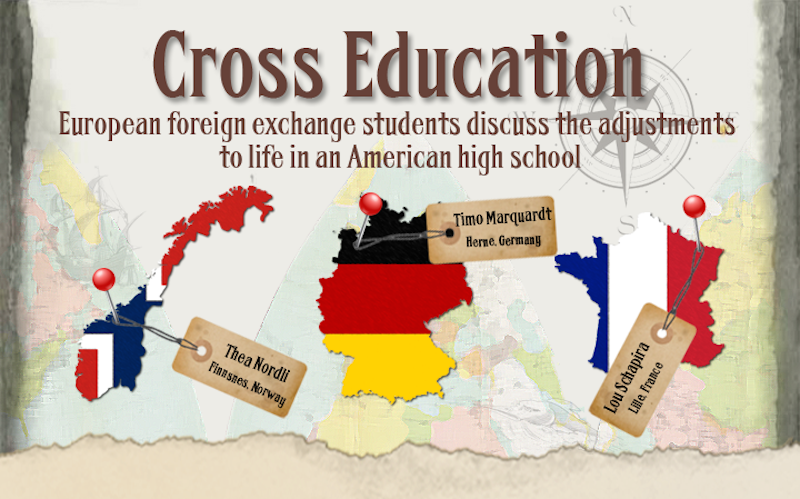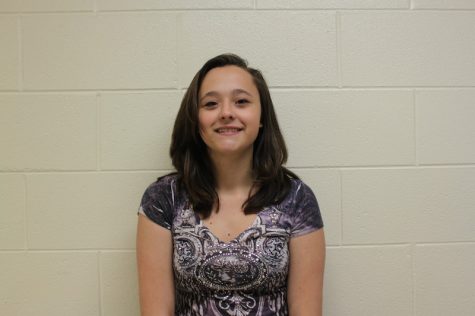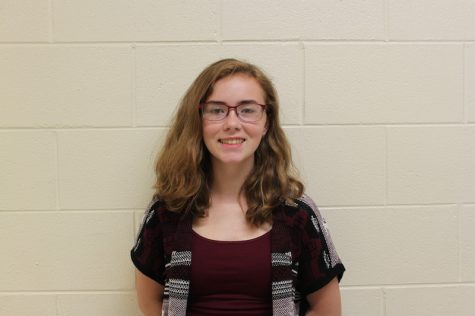Abroad Perspective
April 21, 2017
Sophomore Timo Marquardt, a German exchange student at Central, intensely searches for an unknown term on his phone.
“That’s the word: independent!” Marquardt recalled. “I think I’m way more independent now.”
Marquardt, as well as two other exchange students from Europe, have been calling Central home for the past eight months.
Last year, Marquardt was awarded the Congress Bundestag Youth Exchange (CBYX) scholarship, which was created in 1983 to strengthen ties between Germany and the United States. The program is jointly funded by the U.S. Congress and the German Bundestag, and each country sends 250 students annually to spend a year as student ambassadors.
Marquardt has been staying with sophomore David Underwood and his family.
Senior Thea Nordli from Norway is another exchange student living in Naperville. Nordli first realized that she could become an exchange student in seventh grade and soon discovered the nonprofit organization called the American Field Service (AFS), which offers international exchange programs for students in more than 40 countries around the world.
Like for many other exchange students, the first few days in the United States were challenging.
“You come to a different country, and you don’t know anyone at all,” Nordli said. “It’s a completely different world than you’re used to. You just left all your friends and family, and the language is very confusing. It was scary.”
Her love for traveling and getting to know other cultures inspired her to come to the U.S. The program she is currently in is partially funded by the Norwegian government.
Nordli first started learning English in first grade.
“In the [beginning of the year], it was very hard with the language because I was still translating everything in my head and hearing a lot of new words that I didn’t know,” Nordli said.
Getting into a routine and making friends helped her adjust to a new life in a different country. Putting herself out there and finding where she fit in was also a big part of the process.
“You do grow as a person and become more open minded to other people and other cultures,” Nordli said.
Senior Olivia Rydholm, Nordli’s host sister, has welcomed around 14 exchange students from all over the world. Her family started hosting through AFS due to her mom’s enjoyment of other cultures and seeing how people interact with each other.
She stresses the importance of there being a connection between the exchange student and the host family in order to have a successful exchange experience.
“If you don’t click with them, you are not going to have a good year,” Rydholm said.
Rydholm has had highlights with each student she has hosted, and each student has been different. For people who want to host, it is important to take into consideration the possibility of the exchange student not working with one’s family. How much English the student will know when they arrive is also a factor.
“The language [barrier] is a big challenge for some countries,” Rydholm said. “Just understanding them and trying to help them [can be difficult].”
From being exposed to different cultures and having an overall awareness about others, Rydholm has learned to not judge people as much for their differences.
The third exchange student, junior Lou Schapira from France, is here in the U.S. on a program called International Student Programs Agency (ISPA) and was motivated by her desire to become bilingual in French and English.
Senior Denise Illiev has been her host sister since the beginning of second semester, after Schapira switched host families.
“At the beginning [it was stressful] because I was with a different [host] family, and I had to change families,” Schapira said. “During Christmas I really missed my family [in France] at the time and it was really hard.”
She quickly adjusted to life in the U.S. after only one week but says that it is still sometimes hard to understand people. Schapira has had 11 years of schooling in English prior to coming to the U.S.
“[Illiev] is like my sister now, and it is really cool because I was missing my sister in France,” Schapira said. “It’s hard in the beginning to be far away from your family, but you get used to it […] and the experience of being alone makes you more responsible.”
Illiev and Schapira enjoy doing different activities together such as watching Netflix at home.
“I’m an only child so I’ve never had a sister, and it’s been fun to have someone around,” Illiev said. “I’ve gotten to see what it is like to have a sister and a sibling.”
The experience of being a host sibling has taught Illiev more about sharing and having someone else around, and she has enjoyed having someone there to talk to.
Illiev expresses the importance of these exchange programs, which give students the opportunity to get to know other people and cultures and a new perspective on the world.
The U.S. Department of State funds multiple foreign exchange scholarships that American high school students can apply for including: the Kennedy-Lugar Youth Exchange & Study (YES), where students live with host families in select countries with significant Muslim populations, CBYX (stated above) and the National Security Language Initiative for Youth (NSLI-Y), for students interested in learning less-commonly studied foreign languages while abroad.
Applications for these scholarships will next be available in fall on their respective websites.









